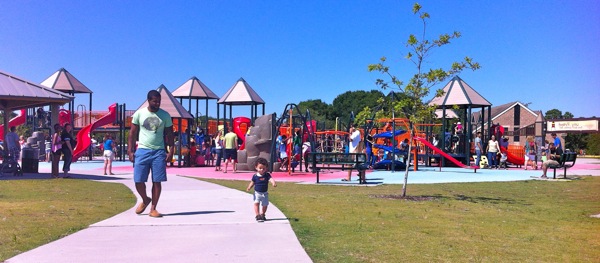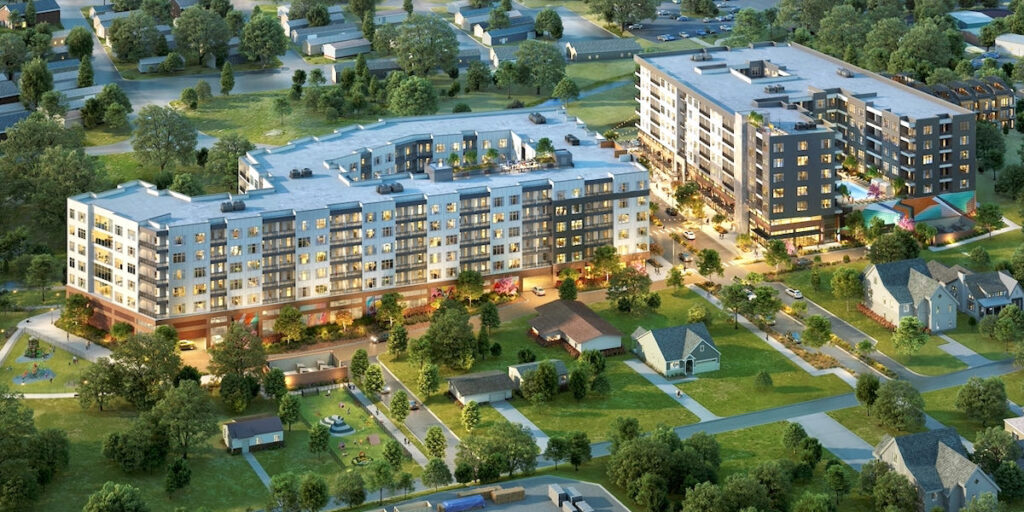In the “old days,” communities were built around religious institutions – literally – the church was the center of the town, both physically and spiritually. Today, as communities become more diverse, especially in the U.S., some churches are experiencing declines in their local congregation. The situation has been exacerbated when COVID in 2020 started a new trend of streaming religious services.
But in some communities, all that is changing, says DeLisa Guerrier, co-founder of commercial real estate firm Guerrier Development, which is spearheading a resurgence in church-centered community development.

“The church is the drinking well – the natural gathering space of the community,” Guerrier observed. “And despite what people may say, in most of the country that hasn’t changed.”
One of her first projects in this genre is a development on Clarksville Pike a few miles northeast of downtown Nashville, Tennessee. There she is helping relocate a church building and in doing so, creating an urban village of sorts with retail and residential amenities – all walkable with the church at the center. The development will feature grocery stores and restaurants, a coffee shop, community gardens, hopefully an ice cream shop, outdoor play spaces and walking trails, childcare facilities and maybe even a swimming pool or golf simulator.
A new study by the Pew Research Centre found that, while virtual church services remain an option long after the COVID-19 shut-down, most people who attend religious services prefer to do those in-person, rather than online. The primary reason, the study cites, is that respondents feel a stronger sense of connection and community with fellow participants.
About half (52 percent) say this – more than three times the share who name any other reason. One unlikely industry is doubling down on this trend – Commercial Real Estate.
Digital Journal sat down with DeLisa Guerrier, to learn more about how – and why – commercial real estate is powering a resurgence in church-centred community development. The reprint below is from Digital Journal. Reprinted with permission.

Digital Journal: Tell us about this concept of building entire neighborhoods that are centered around a church community.
DeLisa Guerrier: Personally, for the last four to five years in my development career, I have noticed that developers are putting buildings up, but they aren’t thinking about community. So, a lot of our projects have been very community focused. It was a really good friend of mine, Mel McGowan, who pointed out that the church is the drinking well – the natural gathering space of the community – and despite what people may say, in most of the country that hasn’t changed.
So, I really started thinking about how we could help churches who not only are typically one of the largest landowners in a given neighbourhood, but also have a desire to bring the community together and to be good stewards of what they have. It took some creative problem solving to connect all the dots so we can keep the church at the centre of the community and place it strategically on the site, where people have access to it, as well as all the amenities they need.
DJ: What kinds of amenities or businesses would be found in a community like this?
Guerrier: That’s the really fun part. Once we create a masterplan and know where the church is going to be, and all of the housing – typically we’ll have a mix of multifamily units and cottage-style townhomes – then we can start to figure out what other uses are appropriate for this market area. In this particular development on Clarksville Pike, for example, there are currently a lot of needs in the community for which we are hoping to provide solutions. For example, there are very few places to get food – grocery or restaurants, there are no coffee shops for meetings and no community centres.
We’re not going to have a large supermarket or big box store, but we will bring components to check a few of those boxes. We will have community gardens, hopefully an ice cream shop, outdoor play spaces and walking trails, childcare facilities and maybe even a swimming pool or golf simulator.

DJ: What are the benefits of building communities like this?
Guerrier: Well, as that survey mentioned, most people have a desire to be a part of the larger community. To have someplace to go that is undeniably theirs. Around the world, there is another parallel trend to develop what is called “blue zones” – introduced to me by a friend, Zac Thomas, early in my development career. That is the process by which we create livable, walkable, bikeable, and vibrant communities where people live longer and better with a higher quality of life. The National Institutes of Health have even done studies that prove people around the world who live in such blue zones tend to live longer – up to 100 years old on average.
DJ: What are some of the challenges associated with this kind of development?
Guerrier: Specifically when dealing with churches, there can be disagreements between what the church leaders think is best compared to some of the input from the congregation. Change is difficult, so if you’re moving the physical worship space, for example, you might get some initial pushback from the community itself. But these kinds of challenges can be overcome with good communication and, more importantly, conversations with the community to ensure everyone’s voice is heard, validated and responded to.
DJ: How do you avoid gentrification in a development project like this?
Guerrier: Not surprisingly, that has come up a lot, and to be honest, this has to be thought through from the very beginning. We need to figure out how we can develop with the goal of reducing the chance of the project being the catalyst for gentrification. It takes an interesting balance. You need to be able to provide housing to the people who need it and make it attainable without giving it a classification of “affordable housing.” What we’ve found as a solution is to create unit types and offerings that we can offer to the workforce, to the people whose salary is fixed, and to the existing community. We have worked to create a program through the church where anyone can apply to live for a reduced payment – for the teachers and police officers – the people who already live and work in the community.
DJ: What’s the status of your Clarksville Pike development, and do you have similar projects in the works?
Guerrier: With developments like these, it’s always difficult to make hard deadlines or timetables, but we are aiming to have the church and retail up and running and residents moving in by 2026. As for similar projects, we’ve been approached by several churches who are looking to accomplish similar goals and we will be announcing them as they come online and when we are at a point where it’s appropriate to share with the broader public.

WHAT DESTINATION CHURCH COMMUNITIES CAN DELIVER
Think about the places where you travel and stay. People often go to destinations for one-of-a-kind experiences. So you may go to Indianapolis, Indiana for motorsports, Williamsburg, Virginia for colonial history or Nashville, Tennessee for music. Many cities and even smaller communities are known for unique qualities that make them a choice place to visit. Once you plan to go to one of these places then you often begin to plan your stay. That includes looking for nice accommodations, good food, entertainment, convenience and all of that ideally packaged in a pleasant, friendly and welcoming environment. Destination church communities can deliver that and much more. They are a Master Planned Community (MPC).
Better Homes & Gardens notes this about MPC’s, “the main draw for these communities is the abundance of amenities.” They continue, “Another great perk? The ability to socialize and gather with other residents.” In some cases these communities have more significant populations of certain demographics, like Chinatown in NYC that has a large population of Chinese and Lancaster, Pennsylvania that has a large population of Amish. Destination church communities can be rich in both amenities and Christian populations who can be family-friendly, values-driven, creative, hard-working, creation-care motivated, compassionate and more. No, destination church communities are not heaven on earth, but often the “master plan” is to nurture a community that reflects and brings honor to the Master – God.
Teravalis in Arizona celebrates that MPC’s, can be close-knit communities. They say, “MPCs are designed to foster a sense of togetherness brought about by the number of locations where people can enjoy shared interests and socialize. This is a benefit not only for adults but also for children. Living near popular destinations like parks or taking part in local community events helps to provide a positive social network for children. The more close-knit a community is, the more support residents provide for one another.”
People traveling appreciate being able to find and stay in a close-knit community, which is why destination church communities have so much potential to shape travel.

ENVISIONING THE POSSIBILITIES FOR TRAVELERS
With destination church communities, travel becomes much more than just going someplace for work, an event or to see and do things. Park spaces become a splendid playground for fitness and fellowship. Eating, shopping and networking become more robust than ever before with Marketplace Ministry Suites. The “stay” becomes an enjoyable, meaningful and even valuable experience in and of itself. AND – that church located at the center of the community will likely be open for biblical instruction, praise, worship and fellowship more than just Sunday – perhaps 7 days a week

Moreover, in today’s connected world through phone, email, social media, text and more, destination church communities can be the place of choice where people stay when traveling. It can lead to new and lasting acquaintances, contacts, friendships, opportunities, collaborations and for the church to do church in ways that only God could have envisioned.
CONTACT US at map – A Travel Lifestyle Magazine to learn more about how your church can build a destination church community.






